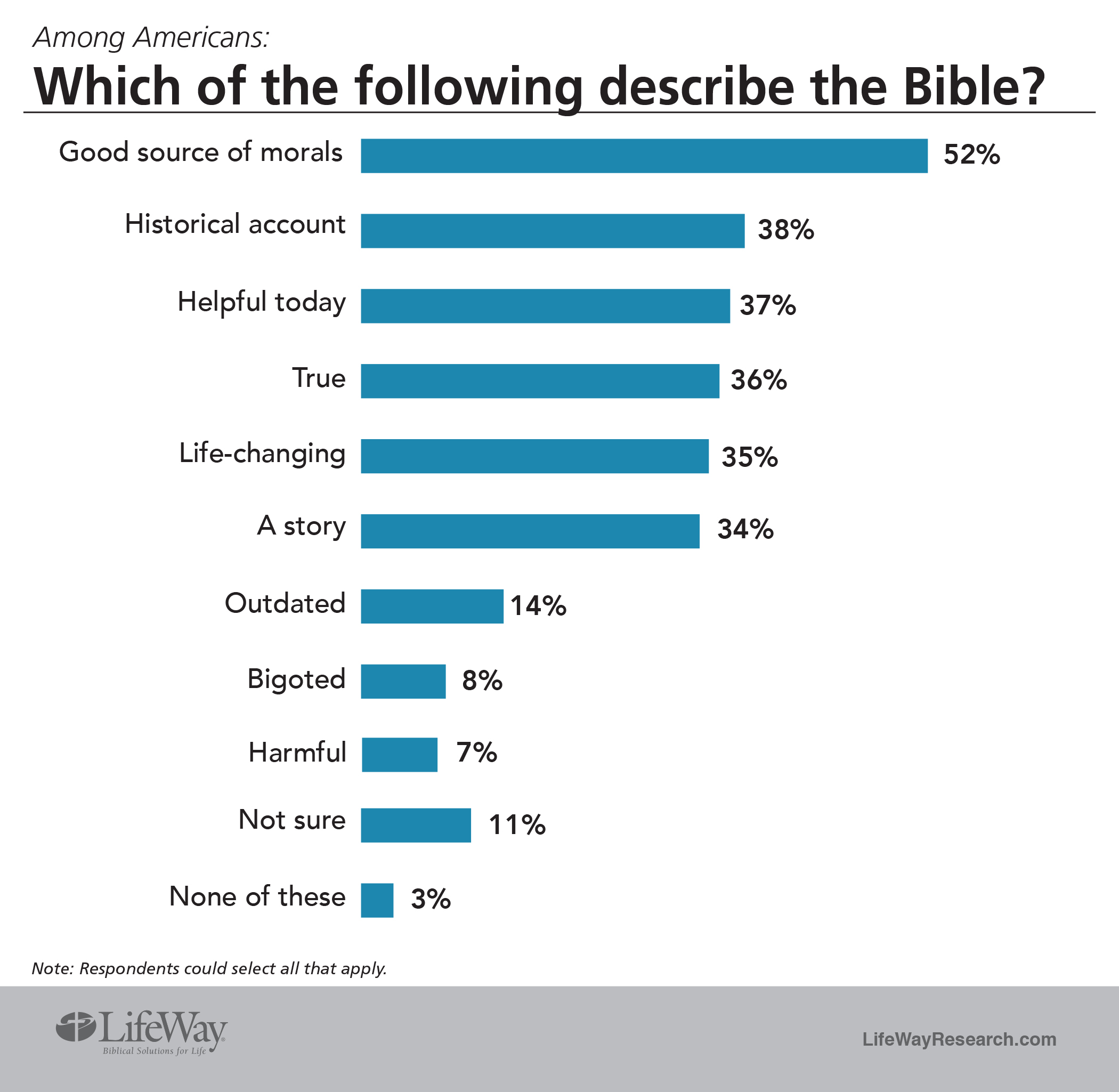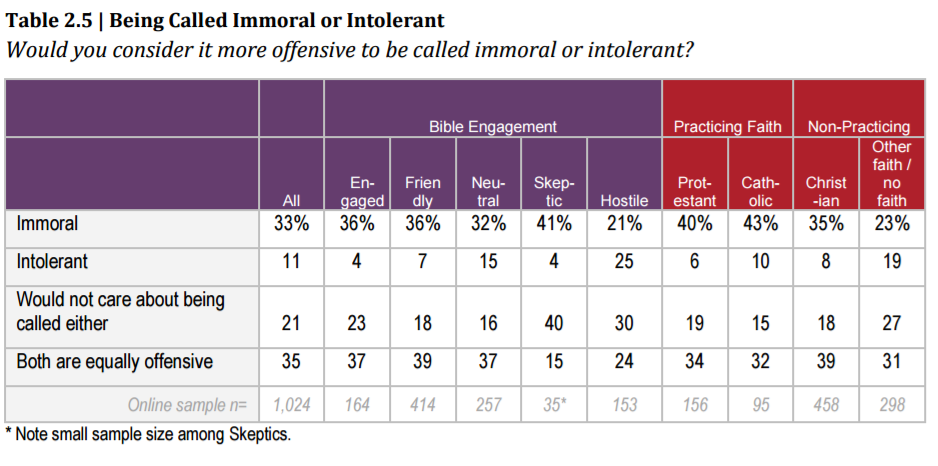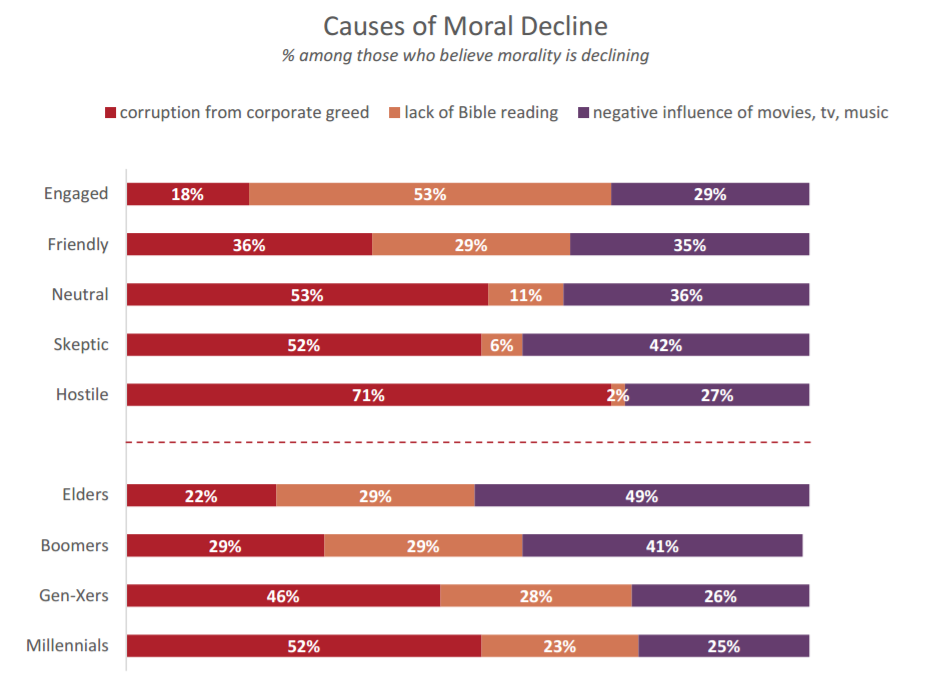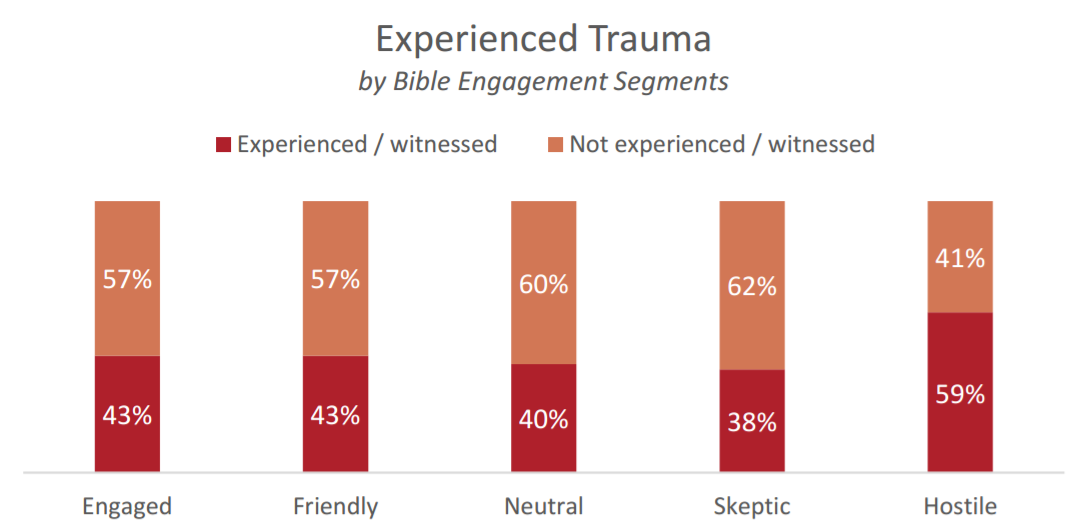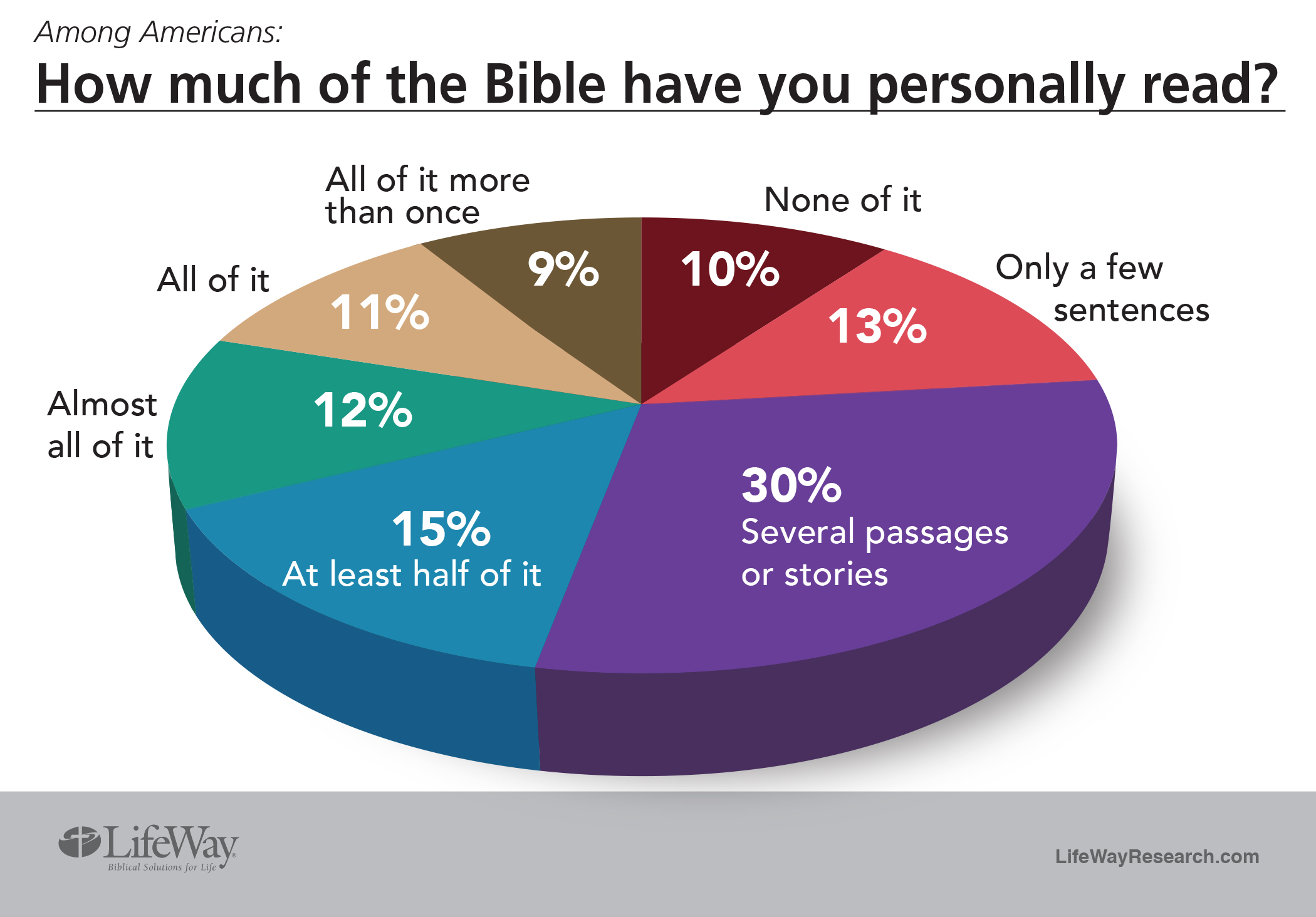For the most part, Americans have positive things to say about the Bible. More than half call it a good source of morals (52%). About a third say it’s helpful (37%), true (36%), and life-changing (35%), according to a new LifeWay Research survey.
Even more told the American Bible Society (ABS) and Barna Group that they believe it’s the actual or inspired word of God (81%).
But a growing segment— 19 percent in 2017, up from 10 percent in 2011—say it’s simply a book of teachings and stories written by men.
That group has remained fairly stable in recent years (17% in 2013, 19% in 2014, 21% in 2015, and 22% in 2016). So this year for their State of the Bible report, ABS and Barna asked the people in that category a new question: If you think the Bible was written only by humans, do you think it was meant to be manipulative or controlling?
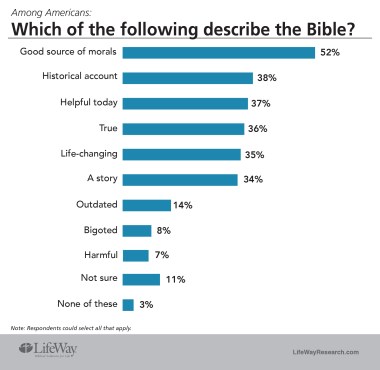
Almost 4 out of 5 skeptics said yes, which adds up to 13 percent of the US population. (A similar number of Americans told LifeWay that the Bible was bigoted (8%) or harmful (7%).)
ABS and Barna labeled them Bible hostile. They used a different tag—antagonistic—in 2013 for the entire group of skeptics, but then reconsidered.
“‘Antagonistic’ may too strongly pigeon-hole those who have not yet embraced the Bible,” Geoffrey Morin, ABS chief communications officer, told CT then. “The new categorization, ‘Bible Skeptics,’ is both more accurate and more hopeful.”
This year, the survey broke the group in two, and found a marked difference between the resulting 32 percent that remained “skeptics”—those who believe the Bible was not divinely inspired, but neither was it written with the intent to manipulate—and the 68 percent that qualify as “hostile.”
Researchers summarized the two groups: “Hostiles’ average age is 41. He is more likely to be an unmarried male from the Gen-X or Millennial generation. Hostiles are largely non-Christian, do not attend church, and a small 5 percent report reading the Bible at least three to four times a year.”
Skeptics are slightly older—on average, 43 years old. “More college graduates fall into this category than any other category. … [T]hey are largely single and not Christian, and most are unchurched.”
Hostiles are more likely than skeptics to be white (68% vs. 56%) or Hispanic (18% vs. 13%). They’re less likely than skeptics to make under $50,000 a year (39% vs. 47%) and more likely to make over $100,000 a year (27% vs. 14%).
They’re notably less open to the Bible—91 percent of hostiles have no desire to read the Bible more, compared to 74 percent of skeptics. They’re more likely (53%) than skeptics (37%) to say that none of the traditional sacred texts—the Bible, the Qu‘ran, the Torah, or the Book of Mormon—are holy.
Nearly three-quarters of hostiles believe the Bible has too much influence on US society (72%), compared to less than half of skeptics (42%).
Fewer hostile adults believe the Bible is important for the country’s moral fabric (9%, compared to 30% of skeptics), while nearly all (91%, compared to 70% of skeptics) believe the Constitution is morally important.
They also don’t care about being labeled immoral: only 21 percent are bothered, compared to 41 percent of skeptics and 36 percent of the Bible-engaged or Bible-friendly.
However, “being called ‘intolerant’ is particularly bothersome to hostiles,” the ABS study reported. A quarter would find that offensive, compared with 4 percent of skeptics or the Bible-engaged.
Skeptics report that they wouldn’t care if they were called either intolerant or immoral (40%, compared to 30% of hostiles and 23% of the Bible-engaged).
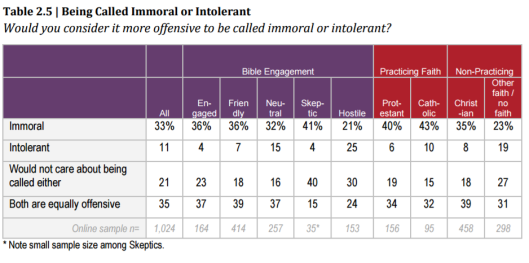
More hostiles (63%) than skeptics (59%) told Barna that morality is on the decline, though they’re far less likely to believe that than the Bible-engaged (95%). And they’re more likely to blame it on corporate greed (71%, v. 52% of skeptics and 18% of the Bible-engaged) than on a lack of Bible reading (2%, vs. 6% of skeptics and 53% of the Bible-engaged) or a negative influence from movies, television, and music (27%, vs. 42% of skeptics and 29% of the Bible-engaged).
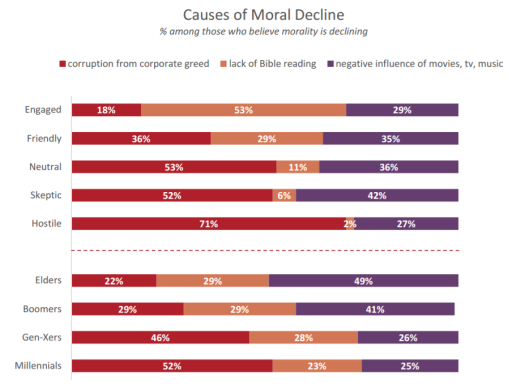
Despite their antipathy, you can find a Bible in most hostile (62%) and skeptic (67%) homes; in fact, half of them own more than one. Hostiles and skeptics equally report being at least somewhat knowledgeable about the Bible (61%), and they are. More than 3 in 10 knew that Jesus was betrayed by Peter (36% of hostiles vs. 30% of skeptics); even more knew Mary Magdalene was the first to see Jesus after his resurrection (44% of hostiles vs. 38% of skeptics).
And most said the Bible encourages serving the poor (86% of hostiles, 79% of skeptics), patience (83% of hostiles, 78% of skeptics), and generosity (85% of hostiles, 96% of skeptics).
About 3 in 4 Bible skeptics said the Bible had no influence on their views on abortion, Israel, LGBT issues, refugees, money, immigration, and war. More than 9 in 10 hostiles said the same.
Hostiles are more likely to say that the Bible has exacerbated racial tension (79% vs. 70%) and gender inequality (93% vs. 83%) over the years. They’re also far more likely to say that the Bible oppresses the LGBT community (58%, compared to 22% of skeptics), women (43% vs. 14%), and different races (29% vs. 12%.)
Bible hostiles are more likely to describe a daily Bible reader as judgmental (39%, compared to 19% of skeptics), narrow-minded (38% vs. 21%), or foolish (23% vs. 6%).
Hostile adults are significantly more likely than any other group to report experiencing or witnessing trauma (9%), and most of them experienced that trauma personally (50%).
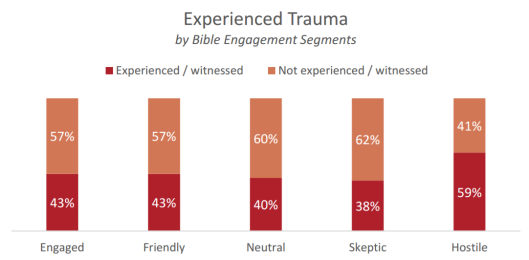
ABS noted that the rising trend of Biblical skeptics seems to be leveling off, but that it was “too early to say the decrease in Bible skepticism is a trend.”
“We are optimistic,” stated Morin, now ABS executive vice president of ministry mobilization. “[We] will continue tracking the data in the coming years to measure how the number of people who are skeptic[al] toward the Bible changes.”
The percent of those who are Bible-engaged—believe the Bible is the actual or inspired word of God and read it at least four times a week—has remained steady at around 20 percent of the population for the past seven years.
The translation they engage with most is the King James Version at 31 percent, though it’s down from 40 percent in 2016. The New King James Version also dropped slightly, from 12 percent to 7 percent, while the New International Version (11% to 13%), English Standard Version (5% to 9%), and Amplified Bible (1% to 7%) all saw increases in use.
Those who read the Bible were more likely to say that it brought them close to God (68% vs. 57% in 2016) and less likely to say that they sought directions or answers for problems (9% vs. 17% in 2016).
Overall, about a third of Americans have read through all or almost all of the Bible, LifeWay reported this week. Another 23 percent haven’t read more than a few sentences.

The amount of the Bible that Americans have read seems to correlate with the way they read it.
“Twenty-two percent read a little bit each day, in a systematic approach. A third (35%) never pick it up at all, while 30 percent look up things in the Bible when they need to,” reported Facts & Trends. “Nineteen percent re-read their favorite parts, while 17 percent flip open the Bible and read a passage at random. A quarter (27%) read sections suggested by others, while 16 percent say they look things up to help others.”
About half of evangelicals said they chose the systematic approach, reading a little each day (49%).
Editors Note: The term "antagonistic" instead of "hostile" was used in an earlier version, per ABS and Barna.


